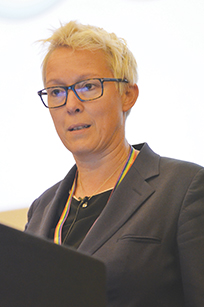Value summit: focus on variation essential but change will take time

The summit – organised by the Healthcare Costing for Value Institute and Future-Focused Finance – brought together clinicians and finance professionals to discuss the move to value-based healthcare.
Ms Clarke (pictured) – current vice-president of the HFMA – joined Royal Free colleagues to describe a major redesign programme that aims to standardise best practice across the trust’s pathways and then use technology to sustain delivery.
She told the conference that it was vital to get everyone focused on variation and that clinical leadership aligned with financial leadership was essential. ‘But this takes time,’ she said. ‘It has been a massive organisational change and we have totally changed the way we run the organisation. It is not an easy gig, but it is [a journey] that I think we all need to go on.’
Built on work at the US InterMountain Healthcare System, the London trust has created clinical practice groups (CPGs) to develop consistent patient pathways across all three hospitals in the group. Using quality improvement techniques, the CPGs have mapped out existing and preferred patient journeys, initially starting with 20 pathways for high-volume conditions.
Underpinned by its Cerner electronic patient record, the trust is digitising these pathways to support clinical practice and ensure that preferred processes are maintained into the future.
There are high-level expectations that each pathway will deliver 6% cumulative savings (2% a year over three years), leading to a possible £20m savings.
In a further example of pathway change, clinicians and managers from Alder Hey Children’s NHS Foundation Trust described its evidence-based approach to revising the bronchiolitis pathway that reduced length of stay for babies from 4.5 days to 2.9 days.
This involved a major education programme to reinforce a pathway that didn’t use treatments where evidence showed no value, minimised unnecessary tests and prioritised earlier safe discharge.
The systematic review involved nurses, doctors and patients. However, the trust warned that, having improved the pathway, resources are needed to ensure it continues to be followed.
Muir Gray, founding director of the Oxford Centre for Triple Value Healthcare, called for a much greater focus on population value – how resources are being invested to optimise outcomes for a given population.
The government has promised to increase GP numbers by 5,000. But Sir Muir suggested the increase in laboratory testing in recent years was consuming additional time to review these tests, equivalent to nearly as many whole-time GPs. Was this really how the NHS would have planned to use this resource?
He said there must be much greater focus on how resources were allocated, with a value framework for different population groups that specified the outcomes that mattered to patients and populations and the resources available.
EVO: building confidence in data
The Healthcare Costing for Value Institute and Future-Focused Finance have teamed up to develop a new service for provider trusts. Trusts signing up to the new EVO (Engagement Value Outcome) framework will be supported to improve their understanding and use of patient-level information and costing system (PLICS) data.
Working with three specialties/services at each trust, EVO will bring together key staff from different disciplines who would benefit from using the patient-level data. Building on existing quality improvement work – for example, using Getting it right first time or Model Hospital data – the programme will help participants to interpret data and explore opportunities to reduce unwarranted variation.
The EVO framework aims to provide each participating trust with the necessary tools for self-implementation so that it can roll out the learning across further service lines.
The framework is currently being piloted at four providers, covering the acute, mental health and community sectors. Following an external review of the scheme, EVO will be formally launched in 2020. For more details contact [email protected] or see the website http://hfma.to/9g
Related content
We are excited to bring you a fun packed Eastern Branch Conference in 2025 over three days.
This event is for those that will benefit from an overview of costing in the NHS or those new to costing and will cover why we cost and the processes.